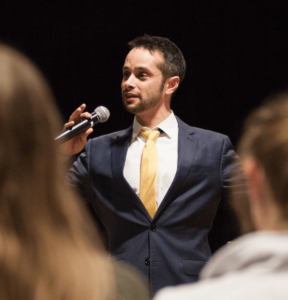by The Cowl Editor on December 7, 2017
Campus
Dr. Richard Barry Speaks at Christmas Themed Theology on Tap
by Daria Purdy ’19
Asst. News Editor

The last Theology on Tap event of the semester was appropriately focused on Christmas and, in particular, on Santa Claus. Dr. Richard Barry, a member of the theology department at Providence College and an expert in systematic theology, explained how the religious outlook of many teenagers can be equated with Santa Claus. The talk took place on Thursday, November 30, in McPhail’s.
Barry discussed sociological studies on teenagers’ views on religion. According to these studies, many American teenagers believed that religion was about making people happy, that God keeps a safe distance from their lives, and that it was important to be generally nice to people and not break any major commandments.
The teenagers in the study were also wary of being perceived as too religious. They did not want to seem like they were pushing their beliefs onto anyone else. Barry explained that the teenagers in the study did not want “to make any universal claims that might make someone anxious or uncomfortable.” The teenagers were also very conventional and passive about religion, with many just taking on the religion of their parents.
Barry called the God of these teenagers a form of “moralistic therapeutic deism.” Many young people believe that religion consists of being generally nice and about making oneself feel good, and that God did not directly intervene in their lives.
Barry equates the God of moralistic therapeutic deism with Santa Claus. Santa Claus demands that people be “nice,” and he keeps a safe distance from peoples’ lives, until that certain time in December comes around.
Barry explained how the Catholic God was different than Santa Claus, and therefore “not less than the God of moralistic therapeutic deism, but at the same time so much more.” The Catholic God demands much of His followers, but accordingly also gives much more. According to Barry, the God of moralistic therapeutic deism does not “challenge our minds and lift our hearts,” while the Catholic God offers profound reflection on the human condition, and the greater mysteries that give life meaning.
Barry said that the Catholic God “calls for us to give everything, but in giving everything, allows us to become free.” Reflection on the Catholic God allows one to not focus on earthly and petty interests, but rather on higher purposes and mysteries.
Taylor Mulhearn ’19 commented,“Dr. Barry’s explanation of the difference between Santa Claus and Jesus made total sense, because with Santa it is a one-sided relationship where you only receive a gift at the end of each year. With Jesus, it is a two way relationship where Jesus is here to help you in times of trouble but it is through suffering you learn the love of Jesus, as Jesus died so we can go to heaven.” Furthermore, Mulhearn said, “Theology on Tap is a great way to take a break from homework and hear an interesting topic or someone’s life story.”
Bridgette Clarke ’18, a student minister for Campus Ministry, organizes the Theology on Tap events. She said that she invited Dr. Barry to give one of the Theology on Tap talks because he is “a fun and interesting professor,” and “when you are talking about God and Santa Claus, I think that you need someone more fun.” Clarke said that she felt that the talk was especially relevant, as she had been reflecting on the questions, “Why are we putting so much emphasis on Santa Claus during Christmas? What does this mean for my life?”
Although this was the last Theology on Tap event for the semester, Clarke said that there was a lot to look forward to for next semester. She hopes to be able to organize a talk from Dr. Dana Dillon, and possibly to organize a talk from an outside speaker